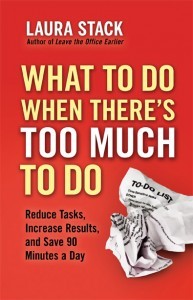"Reflective thinking requires the continual evaluation of beliefs, assumptions, and hypotheses against existing data and against other plausible interpretations of the data." -- John Dewey, American educator. "Reflective thinking turns experience into insight." -- John C. Maxwell, American author and leadership guru. "By three methods we may learn wisdom: first, by reflection, which is noblest; second, by imitation, which is easiest; and third, by experience, which is the most bitter." -- Confucius, ancient Chinese philosopher. As a savvy SuperCompetent, I suspect you take a few moments occasionally to examine your workflow process, carefully considering what works and what doesn't so you can maximize your productivity going forward. Psychologists call this process "reflective … [Read more...]
Increasing Productivity:How Reflective Thinking Impacts Workplace Productivity
Increasing Productivity: Great Personal Productivity Podcasts

" Remember self-help tapes? You used to throw them into your car [stereo] or Walkman when you were going on a lengthy trip so you could 'grow on the go' and hope to return home all the better for it... Well, podcasts that discuss various aspects of productivity very well could be the evolution of those self-help tapes." -- Mike Vardy, Stepcase Lifehack. "Productivity is never an accident. It is always the result of a commitment to excellence, intelligent planning, and focused effort." -- Paul J. Meyer, American motivational speaker. "None of the world's problems will have a solution until the world's individuals become thoroughly self-educated." -- R. Buckminster Fuller, American author, designer, and inventor. From a productivity standpoint, the relentless march of technology allows … [Read more...]
Managing Your Time: Laura’s Latest Book

Need some guidance on managing your time when there is simply too much to do? My new book, What to Do When There's Too Much to Do: Reduce Tasks, Increase Results, and Save 90 Minutes a Day (Berrett-Koehler) is already available for pre-order on Amazon, and the pub date isn't officially until July 2! http://amzn.to/tZ7kAP … [Read more...]
Telecommuting: Creating a Productive Home Working Environment

These days, telecommuting (a.k.a. telework) is simpler and more cost-effective than ever before—which means that many office workers can pursue their careers without setting foot in a traditional office, except when absolutely necessary. Although some businesses still resist this option, others have begun to embrace it in a serious way. As overhead and transportation costs continue to rise, and other benefits pile up, there's little doubt that this trend will accelerate. That being the case, you may very well end up working from home at some point, whether you initiate the change or your company does. Thus, it pays to learn how to create the most productive home office environment possible. In this article, I'll outline the basics. Set Up Your Workplace One of the nicest things … [Read more...]
Personal Productivity and Your To-Do List
"My to-do list is so long that it doesn't have an end; it has an event horizon." -- Craig Bruce, Canadian Software Engineer. "According to USA Today, an astonishing 95 percent of companies don't share their strategies with employees." -- Joel Garfinkle, American inspirational speaker. Efficient time management requires the establishment of a dependable routine. The modern office worker can tap a variety of tools when constructing such a productivity framework, with the simple to-do list arguably the most important tool in the chest. But this begs a question: What rules do you apply to determine what goes onto your daily to-do list in the first place? In other words, how do you decide what you should be working on each day? This question goes to the very heart of personal … [Read more...]
Lessons in Retention for TM practitioners
Lessons in Retention for TM practitioners By Carlos Botero, VP of HR, DIRECTV From the September 8, 2011 meeting of the CO New Talent Management Network (www.contmn.com), at the DIRECTV facility at 161 Inverness Drive West in Englewood, as written by Laura Stack. Under the leadership of Carlos Botero, who took over as VP of HR in July 2008, DIRECTV is on track for a 24% employee churn in 2011, down from a high of 110% in 2008. How was this accomplished? Here are my key take-aways from his presentation on employee retention. 1. "Great talent follows great talent." Procedures can only take you to a certain percent of turnover, and then you rely on the hearts of your employees. If it’s a great place to work, their buddies ask them, "Hey, can you get me a job?" 2. "If you … [Read more...]
Email Productivity
I'm curious to know how often you check your email each day. Please vote in my poll: http://linkd.in/nTAJVK. Please comment; I'd love to hear your thoughts on the impact email has on your daily productivity. … [Read more...]
The Implications of Declining Productivity

"If demand remains weak, there’s a danger that businesses may try to boost productivity by cutting jobs." -- Paul Dales, American economist, regarding the recent 2011 Q2 productivity drop. "Nowadays, business is all about productivity—and our folks produce." -- Senator John Hoeven, former governor of North Dakota. "[If] you don't have a very motivated working class, it starts to affect the dynamics of the economy. If workers are disenchanted and disenfranchised, productivity losses will go along with that." -- James Sinegal, American businessman, founder and CEO of Costco. From a business perspective, productivity is defined as the rate at which goods or services are produced per unit of labor. It's an important measure of corporate success, and, on a wider scale, a primary metric of … [Read more...]
Should You Try to Learn from Failure…Or Just Forget It?
"If at first you don't succeed, try, try again." -- Traditional saying. "The better a man is, the more mistakes he will make, for the more new things he will try. I would never promote to a top-level job a man who was not making mistakes... otherwise he is sure to be mediocre." -- Peter Drucker, Austrian management consultant and social ecologist. "Remember, you only have to succeed the last time." -- Brian Tracy, Canadian self-help guru. In the modern business world, failure is often made out to be something glorious, a virtue that almost inevitably leads to success in the long run. Oft-cited examples include Edison's 1,000+ unsuccessful attempts to invent the light bulb before hitting on the right solution, and Bill Gates' unsuccessful first computer business. We're told, again and … [Read more...]
Assertiveness and Direct Communication: Your Wording is a Critical Productivity Tool

One of the factors that sets human beings apart from the rest of Creation—that has, in fact, helped make us the dominant species on this planet—is our ability to communicate in great detail, with a minimum of confusion and unproductive "noise." That said, it's amazing how easy it is to fail to communicate properly. The annals of history are replete with episodes of poor communication (or a complete lack thereof) that led to widespread misery and pain. On a lesser scale, individuals and businesses have to deal with miscommunication issues every single day; and in the workplace, such issues can have a severe impact not just on individual productivity, but on the overall bottom line. Even when the lines of communication are wide open, you can fail to communicate if you use the wrong words … [Read more...]


